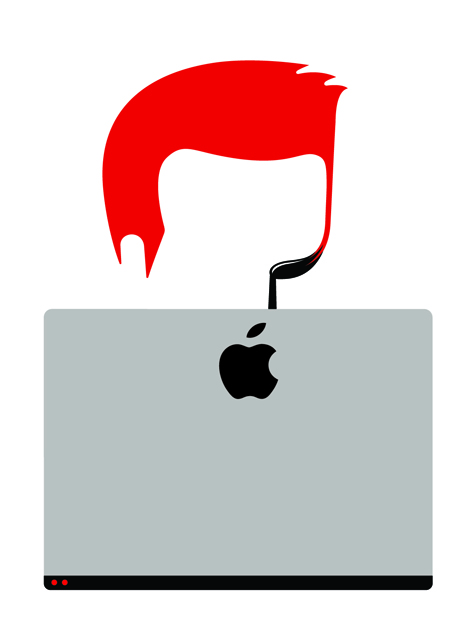Thursday, 1 April 2010
Noma Bar Interview
Noma Bar is a man of few strokes. But don’t let the simplicity fool you. His talent lies in his efficiency in depicting characters and social issues. With bold colors, shapes and one or two icons he captures the spirit of a person. Other times he communicates a message on a social issue with amazing clarity while adding a bit of humor to everything. Whether the message is about violence or equality, his straight-forward visual approach is refreshing.
How does your background influence your work?
I was born in the north of Israel in 1973. Israel was a young country with lots of influence from the Bauhaus school. The architecture had a lot of squares and straight lines. But there is also something else about Israel. There was the spirit of improvisation, in terms of how people create things, recycling and using ready-made.
Nevertheless it was quite sleepy and I didn’t want to stay there. Around my house there were original paintings. My mother was quite illustrative and playful. For example she made the handle of the toilet into a [silhouette of a] duck. We also had Hello Kitty things around the house.
Before I came to London I studied Hebrew typography. I was trained as a typographer, not as a illustrator. And of course there was no great demand in London for a Hebrew typographer. In my [current] work, I have typography influence. It’s like working with the elements of a letter. It’s coming to this idea, no nonsense, monumental shape.
How do you describe your work?
Sometimes I would say visual communication. It is not exactly graphic design and not exactly illustration. I make brief illuminations. Putting light on the subjects and developing subjects is classic illustration. But it looks like graphic design. What I’m doing exactly, is part characterture and part politics. It is about the subjects. I’m a visual comedian, a graphic comedian. It is in a sense, less and less graphic design and more illustration. It needs to be funny. It needs to bring a smile. This kind of emotion is very important.
How did you come to develop this style?
I’m attracted to actors that don’t use words. Maybe it is because I come from a foreign country and I have to do a lot of non-verbal communication. Comedy really influences me. I admire silent films because they have the ability to make people laugh without saying any words, basically doing visual things without talking. My work is like a comedy dialogue, short jokes, short stories. It quite similar to comedy in that it ends with a punch line.
How long does it take you?
It can take a couple of weeks or a day. It is different with different projects. Portraits are challenging. It is a struggle to find the right ideas. For me the idea has to comes first.
What is the most challenging portrait?
They are all challenging. Britney Spears was pretty hard. People with beautiful faces are hard to capture with a few strokes. Her face is so balanced so it is hard to find something to grab onto. I prefer ugly faces, they are much easier. Nick Hornby took me ages. He has a large music collection. I was thinking about using a record, the outline of it. I didn’t want to put two records. My challenge is to use one element and nothing extra.
What is your working process?
I do a lot of drawings. I have more than 60 sketch books. The sketch book is part of me, a on-going diary. When I go to the computer I already know what I’m doing. Almost all the conceptualizing is done.
Where do you find inspiration for your work?
I like doing drawings in the Underground Tube. Sitting on the Tube is like a gallery of people of different faces. Everyone capitulated in one line and they change all the time. I also look where many people don’t look. For example things on the floor. A lot of things happen on the floor. I look at negative spaces. I would look at the space between two cars, instead of the cars. In a sense I’m always looking and getting all the wrong information.
I really like Highgate woods, this is actually part of my routine. In the morning I’m in the woods for a couple of hours a day. I try not to sit on the same bench. I need to find new benches so I can surprise myself.
Are there any guidelines you live by as a illustrator or can give to other artists?
Find your own thing and find your inner voice. If it suites you, really give shape to it. It a journey. Don’t be fascinated by what everyone else is doing. When people are always changing their styles they are not faithful to who they are. I can do a lot of things but I don’t.
Also think a lot. Think hard before you start to do something. I spend more time thinking than illustrating. I need to surprise myself with good ideas and not just illustrate beautiful pictures.
Name a few things that currently inspire you:
My new studio that I moved into a few months ago inspires me to make a lot of work. It is nice big place for myself. I’m in here 19 hours a day.
Rather than checking out outside things for inspiration, I’m constantly milking myself [of more work]. Where ever I am, I can find inspiration. Basic things, things that are very close to me help me work.
Interview From Grain Edit
Subscribe to:
Post Comments (Atom)


No comments:
Post a Comment